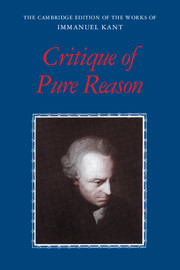Book contents
- Frontmatter
- Contents
- General editors' preface
- Acknowledgments
- Introduction
- Immanuel Kant, Critique of Pure Reason
- I Transcendental doctrine of elements
- Division two. Transcendental dialectic
- II Transcendental doctrine of method
- Chapter I The discipline of pure reason
- Chapter II The canon of pure reason
- Chapter III The architectonic of pure reason
- Chapter IV The history of pure reason
- Editorial Notes
- Glossary
- Index
Chapter IV - The history of pure reason
from II - Transcendental doctrine of method
- Frontmatter
- Contents
- General editors' preface
- Acknowledgments
- Introduction
- Immanuel Kant, Critique of Pure Reason
- I Transcendental doctrine of elements
- Division two. Transcendental dialectic
- II Transcendental doctrine of method
- Chapter I The discipline of pure reason
- Chapter II The canon of pure reason
- Chapter III The architectonic of pure reason
- Chapter IV The history of pure reason
- Editorial Notes
- Glossary
- Index
Summary
This tide stands here only to designate a place that is left open in the system and must be filled in the future. I will content myself with casting a cursory glance from a merely transcendental point of view, namely that of the nature of pure reason, on the whole of its labors hitherto, which presents to my view edifices, to be sure, but only in ruins.
It is remarkable enough, although it could not naturally have been otherwise, that in the infancy of philosophy human beings began where we should now rather end, namely, by studying first the cognition of God and the hope or indeed even the constitution of another world. Whatever crude concepts of religion the old customs, which were left over from the rude state of the nations, may have introduced, these still did not prevent their more enlightened part from dedicating themselves to free investigations of this object, and it was readily understood that there could be no more fundamental and reliable way of pleasing the invisible power who rules the world, in order to be happy at least in another world, than the good conduct of life. Hence theology and morality were the two incentives, or better, the points of reference for all the abstract inquiries of reason to which we have always been devoted. The first, however, was really that which gradually drew purely speculative reason in its train, which subsequently became so famous under the name of metaphysics.
- Type
- Chapter
- Information
- Critique of Pure Reason , pp. 702 - 704Publisher: Cambridge University PressPrint publication year: 1998

